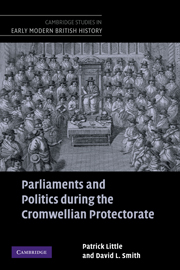Book contents
- Frontmatter
- Contents
- Preface
- List of abbreviations
- 1 Introduction: historiography and sources
- 2 Parliament and the paper constitutions
- 3 Elections
- 4 Exclusions
- 5 Factional politics and parliamentary management
- 6 Oliver Cromwell and Parliaments
- 7 Richard Cromwell and Parliaments
- 8 Law reform, judicature, and the Other House
- 9 Religious reform
- 10 Representation and taxation in England and Wales
- 11 Parliament and foreign policy
- 12 Irish and Scottish affairs
- 13 Conclusion
- Appendix 1 Members excluded from the Second Protectorate Parliament
- Appendix 2 The Remonstrance of 23 February 1657
- Bibliography
- Index
- Titles in the series
11 - Parliament and foreign policy
Published online by Cambridge University Press: 17 July 2009
- Frontmatter
- Contents
- Preface
- List of abbreviations
- 1 Introduction: historiography and sources
- 2 Parliament and the paper constitutions
- 3 Elections
- 4 Exclusions
- 5 Factional politics and parliamentary management
- 6 Oliver Cromwell and Parliaments
- 7 Richard Cromwell and Parliaments
- 8 Law reform, judicature, and the Other House
- 9 Religious reform
- 10 Representation and taxation in England and Wales
- 11 Parliament and foreign policy
- 12 Irish and Scottish affairs
- 13 Conclusion
- Appendix 1 Members excluded from the Second Protectorate Parliament
- Appendix 2 The Remonstrance of 23 February 1657
- Bibliography
- Index
- Titles in the series
Summary
When dealing with Protectoral foreign policy, historians have tended to overlook Parliament, and concentrate on Oliver Cromwell, or his council, instead. Parliament's role is invariably reduced to that of a money-granting body, broadly reflective of public opinion, but essentially reacting to policies formulated, and promoted, by the Protectors and their councils. According to one authority, ‘Parliament served as a sounding-board for Cromwell to make long set-piece speeches extolling his views, achievements and intentions … but its only involvement appears to have been a committee set up to coordinate European Protestant affairs in 1657 – at the initiative of some councillors sitting in the House, not back-benchers.’ Parliament's inactivity was not confined to decisions on policy, for the committee mentioned was (we are told) ‘the only evidence of apparent Parliamentary interest in foreign policy’. This chapter will suggest that such views are entirely fallacious. Parliament's right to become involved in foreign policy decisions was asserted in all three Parliaments, the members displayed a considerable interest in all aspects of foreign affairs, and they were also able to influence policy, both directly and indirectly.
Traditionally, Parliament's role in foreign policy was limited. When the Commons sought to advise James I on the Spanish match in 1621, the king forbade them to ‘argue and debate publicly of the matters far above their reach and capacity’, despite protests from members that debates on foreign policy were merely an extension of their duty to counsel the king on ‘the arduous and urgent affairs concerning the king, state, and defence of the realm’.
- Type
- Chapter
- Information
- Parliaments and Politics during the Cromwellian Protectorate , pp. 244 - 266Publisher: Cambridge University PressPrint publication year: 2007



